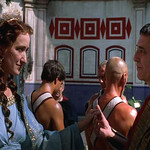
Compare the seemingly inconclusive ending of Mark 16:8 with the following discussion by Sara Mandell and David Freedman on the Histories by Herodotus:
Neither Herodotus nor his implied narrator has to depict the catastrophe, only the exemplar that demands it. (The Relationship Between Herodotus’ History and Primary History, 1993, p.55)
Mandell and Freedman are here observing that Herodotus leaves the catastrophic ending that his plot demands up to the reader’s imagination. What Herodotus has done is depict many examples of cities and persons rising, falling victim to hubris (proudly thinking too highly or exclusively of oneself) and being brought low by the gods or fate as a consequence. These are enough to inform the reader that when the book concludes at the point of Greece’s exalted victory over Persia, the reader knows what is to follow.
The message to readers is to humble themselves to avoid that inevitable fate.
Herodotus thus leaves his Histories hanging at the end. Nothing dramatic or rounded seems to happen at the end. The Persians go home and there is a seemingly irrelevant comment on how they once loved the simple life and were advised by Cyrus not to seek a life of ease.
In the final chapters leading towards this ending that seems to flat to modern readers, Herodotus changed his style to present the illusion that he was dispassionately narrating a strictly historical-factual account of the war between Greece and Persia. But in fact, the tale of Greece’s victories in the way, especially at the Battle of Marathon, are not intended as genuine history by modern standards. The events are a religious paradigm. They are constructed to teach a religious moral. What these final chapters depict in graphic detail, in anecdote after anecdote, is Greece going the way of the nations before her. The Greeks, too, are on the cusp of falling into their own destruction.
Herodotus probably considered the initial rounds of the Peloponnesian Wars as the imploding calamity of the Greeks. He finished off his Histories with Greece at its height as it expelled the Persians. And height means hubris. The gods must cut them back down to size.



